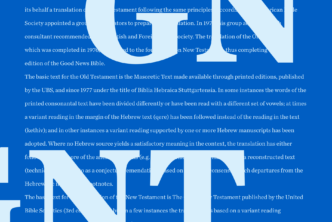Here’s a great question for you Greek students to ask, and a helpful (I hope) answer for you Greek teachers to give. J.H. writes:
I am a second-year student in [a theological seminary] in Nigeria. I am presently taking Greek Grammar 1. My challenge after each lecture is forgetting the endings I learned previously as a result of the ones learnt anew. I would be grateful if you could provide some tips to enable me to keep up.
J.H.,
I’ll give three answers: theological, a practical, and a technical.
1. Theological Answer: Love and Self-Control
Love for something will motivate you in all your learning—love for pleasing your teacher, for besting your classroom nemesis, for impressing a potential mate, for good marks. You should be motivated by the highest and best loves: love of God and neighbor. (See the earth-shakingly good C.S. Lewis essay “The Weight of Glory,” which probes the issue of motivation better than anything I’ve ever read outside Scripture.) Pray for Spirit-filled love for God’s Word and love for the people you’ll serve with your education (Galatians 5:22). Pray also for Spirit-filled self-control in times of drudgery (Galatians 5:23). Interestingly, even the secular language-learning textbook I’ll reference in point 3 spent significant time discussing the “affective domain,” motivations for language learning. Christians, ideally, ought to have the best motivations.
2. Practical Answer: Language and Life
Pedagogical experts have observed that people have different learning styles. But everybody on earth initially learns language—and was designed by God to learn language—the same way: by listening to it being used in daily speech. No two-year-olds have ever successfully been made to learn language via parsing charts. The written form of an established language like English or Koine Greek is going to be somewhat different from the spoken form (we write things we would never say, and vice versa), but don’t let the death of Koine as a spoken language sever the link between Greek and real life. In other words, try to read real-life Koine Greek as soon as possible, to see how it gets used in the New Testament and other Koine literature, even if you have to look up every single word. It will help if you are reading something like the Apostolic Fathers in Greek, which comes with English translation.
3. Technical Answer: How to Learn a Second Language
I am by no means an expert in the process of learning languages, but having acquired a few of them at varying levels of proficiency over the years, I have some reflections. I also did some digging in one of the most recent textbooks on SLA (Second Language Acquisition)—the rigorous Teacher’s Handbook, Contextualized Language Instruction. I could go into a lot of detail, but the upshot dovetails quite nicely with my previous paragraph: language acquisition is “socio-cultural,” requiring a range of competencies that go far beyond memorization of paradigms and declensions. Here’s a line from the book that shows a little of what I mean: “Neither the knowledge of [a grammar] rule, nor the use of the rule when consciously constructing sentences, directly contributes to [language] acquisition—only the repeated use of the resulting utterances serves as the input from which linguistic competence is implicitly abstracted.” (21) Koine Greek is no longer a spoken language (though there are some very interesting attempts to resurrect it as one). But if you can work with a study group, pronounce words out loud, and even try to form sentences of your own, research shows that you’ll come out ahead.
***
- If you don’t already have Bill Mounce’s popular Greek gramar, Basics of Biblical Greek, now may be the time to get it.
- Faithlife has produced its own set of videos for Logos Mobile Ed called Learn to Use Biblical Greek and Hebrew.






